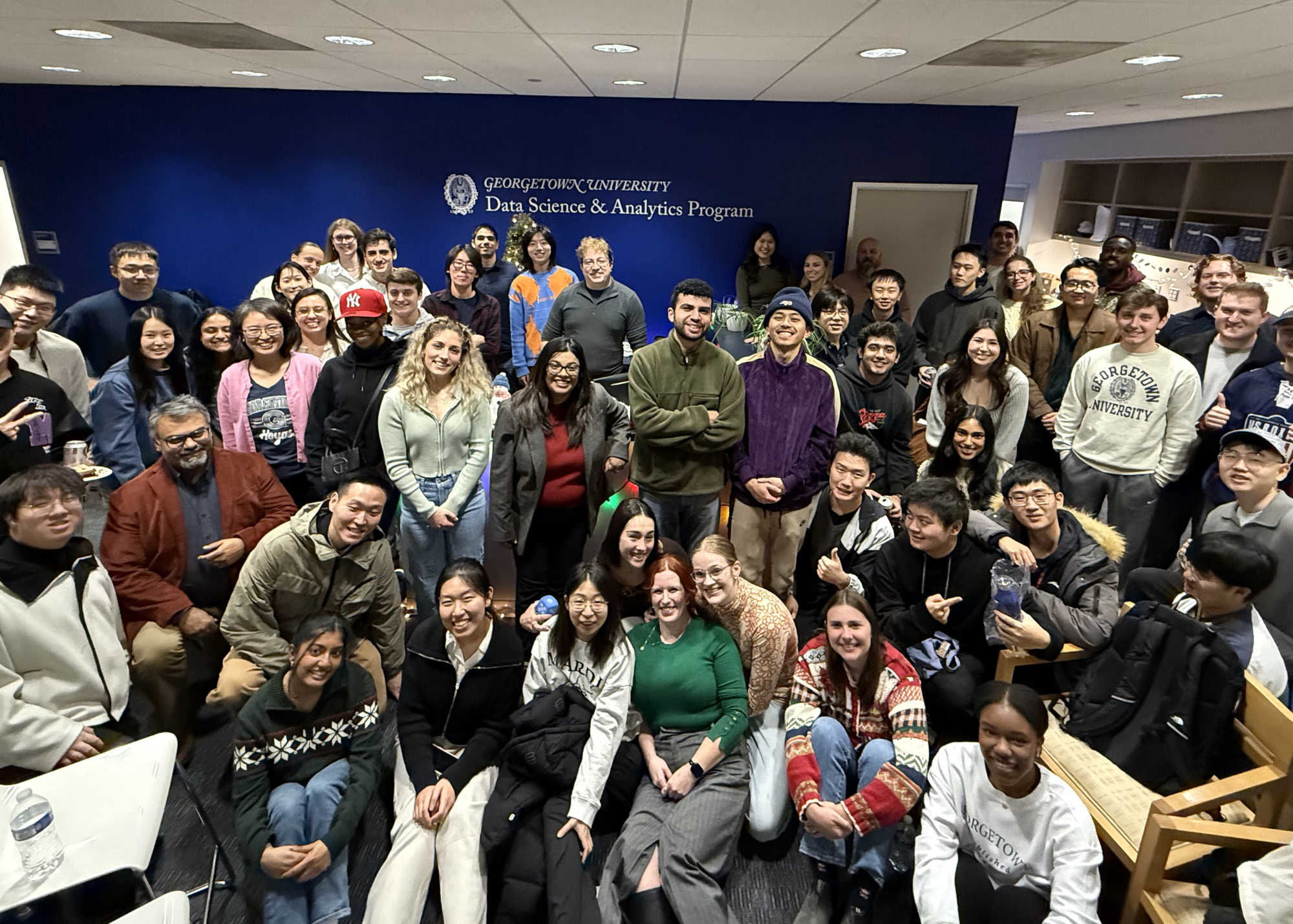Why Getting Involved is Important for Your Data Science Career

Excelling as a data scientist isn’t just about mastering technical skills. Research, internships, and social or administrative roles in the Data Science and Analytics (DSAN) program can provide invaluable opportunities to specialize, develop communication skills, and expand your professional network. I can speak from personal experience– in my first semester at DSAN, I immersed myself in three extracurricular roles, each contributing to my growth in unique ways. I’m a Professional Development Center assistant, helping students with professional growth and applications, and writing blog posts like this one you’re reading now! I am also a research assistant in Dr. Qiwei (Britt) He’s AI Measurement & Development (AIMD) lab, conducting extensive literature reviews on technical topics to support groundbreaking research. Lastly, I worked as a teaching assistant for Dr. Abhijit Dasgupta’s course DSAN 6150: Biological and Biomedical Data Science. While managing these responsibilities was challenging, it improved my efficiency and time management skills and, more importantly, underscored the value of non-technical skills in data science. If you’re a data science student or prospective applicant, you should know that the skills that can be gained from getting involved in new topics and roles are what help you stand out and find your place in the increasingly competitive world of data science.
Why You Should Get Involved
Engaging in various roles and topics can help you find your niche, expand your knowledge, refine your communication skills, and develop meaningful connections—all of which are critical advantages in the data science field.
Finding Your Niche
Getting involved in extracurriculars during your data science studies can help you refine your specific interests as well as better understand your own preferred work style, which are both important for preparing yourself for a job you enjoy in the future.
- Discovering Passions & Interests: Exposure to diverse roles can help define the direction you want to pursue within data science, whether it’s research, teaching, government, or industry-focused work. It may also help you discover certain topics you find particularly moving, whether it may be health, business, entertainment, and more. This will help guide your applications and style in the future and throughout your studies!
- Understanding Your Work Style: Experimenting with different environments helps you identify domains that resonate with your interests and strengths. It’s important to learn about yourself and what kinds of settings and teams you like. For example, you may learn that you enjoy working in smaller teams (four to six people) because that optimizes your balance of collaboration and also independence.
Gaining Knowledge Beyond the Classroom & Connections
Some of the most valuable knowledge I’ve gained from DSAN has come from my involvement, because these opportunities allowed me to work closely with professors and discuss tips with other students. From TAing, I’ve learned many shortcuts in R from helping students with problems and seeing their code. Also, working through problems with other students and seeing their approaches has opened my eyes to new problem-solving perspectives. Furthermore, I’ve learned about internship application platforms and opportunities through my research mentor, Dr. He, and through interacting with other students in the PDC. As an overview, involvement helps you gain the following:
- Practical Learning: Interacting with peers and mentors in various settings often provides insights on resume building, job opportunities, and industry trends that can’t be gleaned from coursework alone.
- Enhanced Technical Proficiency: Learning new software or platforms can strengthen your resume and broaden your technical capabilities, making you more versatile.
- Networking and building meaningful connections: Being involved on a team helps you work alongside talented individuals who can give you valuable mentorship and guidance.
Developing Soft Skills
Getting involved in meaningful projects and extracurricular efforts also cultivates essential soft skills that are critical for success in data science. By engaging in team-based activities, you get exposed to opportunities to further develop skills like teamwork, leadership, time management, and adaptability—skills that are transferable across any domain or career path.
- Teamwork and Leadership: Working on group projects or committees helps you understand how to effectively collaborate with diverse personalities and viewpoints. It teaches you how to motivate and guide others while being receptive to feedback and compromise. These skills are invaluable in collaborative data science environments.
- Communication and Presentation Skills: Roles that require writing, teaching, or presenting enable you to clearly articulate complex ideas to diverse audiences. For example, explaining technical concepts in a research presentation to non-technical audiences are great practice for future career work.
- Time Management and Flexibility: Balancing extracurricular roles with coursework pushes you to prioritize tasks effectively and adapt to changing schedules, and this strategic thinking can translate directly to managing deadlines in professional settings.
- Critical Thinking and Open-Mindedness: Exposure to different projects and problem-solving approaches broadens your perspective, encouraging innovative thinking and a willingness to learn from others.
In short, extracurricular involvement not only enhances your technical foundation but also equips you with the interpersonal and organizational skills that are essential for thriving in any professional setting.
How to Get Involved
There are numerous opportunities within and outside the DSAN program to start exploring.
Within DSAN
- Teaching Assistant (TA): Being a TA is a great way to refine your knowledge on a subject, or get exposure to a new topic which you were not able to study! Being able to teach someone else content helps you really internalize and know the content yourself. This involvement experience is awesome for developing confidence in your knowledge, expertise in a topic, and skills in communicating information and demonstrating technical concepts to others, all of which are qualities that are great to have in life as a data scientist.
- Research: There are two main labs in partnership with DSAN– Dr. He’s AIMD lab, and the Massive Data Institute (MDI). These are AMAZING opportunities for contributing to meaningful projects with data science and learning from talented and well-respected mentors. dddDoing research with a lab helps you gain domain expertise and improve your presentation skills—all while boosting your resume. Additionally, my research experience has helped me become more self-sufficient, efficient, and reliable, as I’ve had to carry my weight for the team effort and communicate my progress.
- Student Ambassador, Professional Development Center, Social Committee: These roles allow you to represent the program, engage with the student body, and refine your leadership skills. Building connections and interacting closely with other students, alumni, or prospective students is a great opportunity for expanding your network and insights.
Outside DSAN
- Part-Time Internships and Work: Opportunities like those listed on Georgetown’s internship page or in government agencies can provide real-world experience and exposure to industry practices. Roles in Think Tanks and Research Institutions allow you to apply data science in policy and research-focused domains, which will enhance your versatility. If you are interested in experimenting with a setting off campus, there are plenty of opportunities that can be found that will provide you with lasting knowledge and a broadened network.
Final Thoughts
While technical proficiency is essential, the skills gained from extracurricular activities—specialization, communication, and networking—are what truly distinguish a great data scientist. By getting involved, you’ll not only expand your expertise but also develop a well-rounded skillset that sets you apart in the field of data science. Though it might seem intimidating to add extra work on top of an already demanding courseload, I argue that being involved actually gives me skills and structure to be more productive, efficient, and able to deploy various perspectives to tackle a problem. For example, the things I’ve learned through my research or talking to others and gaining ideas from them through my involvements have helped me in ways I didn’t expect, like choosing a final project topic that I really liked. With all this being said, please consider this blog as a message to step out of your comfort zone and explore the wealth of opportunities available to you through DSAN and the Georgetown community!
